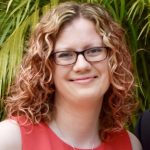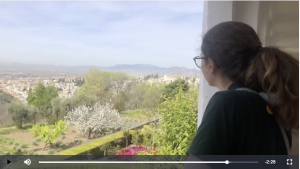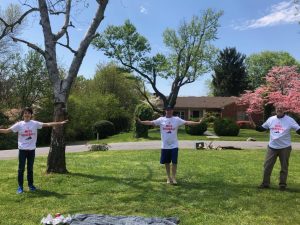SC&A Launches New Collection of Pandemic-Related Reflections

On April 13, Wesleyan’s Special Collections & Archives launched a new project asking the Wesleyan community for personal reflections on the COVID-19 pandemic. University Archivist Amanda Nelson introduced the project by saying, “It’s clear that we are all living and making history right now. As an archivist, I am always interested in recording these efforts so that . . . later, with the benefit of hindsight, [they can] give us and future generations of Wesleyan the ability to reflect on and learn from them.” Here, Nelson provides more insight into how the project came about and how the Wesleyan community can help.
What gave you the idea to do this project?
Amanda Nelson: As an archivist, I am sort of the steward of Wesleyan’s history. It’s my job to keep and make available what’s happened in the past. That’s not just maintaining the records that we already have, but also collecting what’s going on right now, so that future generations will have access to it and get a feel for what [was] going on at Wesleyan.
It’s really rare that you know what is going to be a huge historical moment, but the COVID-19 pandemic definitely is one [instance of that]. It’s very much something that a lot of other archives are doing out there, especially university archives.
But in this case, you’re actually launching a special project and website, and putting out a specific call for submissions to students, faculty, alumni—all the various members of the Wesleyan community, past and present. Why?
AN: I was reading through the faculty forum emails and listening to what was going on around campus in all the different departments and divisions; it was so interesting to hear how differently people adapted to the situation and to get that personal take on what’s happening. It’s easy to collect the administrative side and see what’s happening on the website—I had already been gathering University emails and administrative records surrounding how certain decisions (such as the one to close the University) were being made—but that ephemeral How are you feeling through all of this? is a really hard thing to try to capture. This project is a way to cast as broad a net as possible, so that we can get those kinds of ephemeral ideas and feelings and experiences into the archives. That way when people learn about [the COVID-19 pandemic] in the future and read about it, they actually get a sense of: This is what it was like for a staff member. This is what it was like for a student who had to go home or didn’t know where their next meal was going to come from. It really gives you that personal touchstone.
It’s interesting in this case because, not only are we moving more toward a predominantly digital world anyway, but the nature of the pandemic is such that with social distancing measures in place we’re all being forced to communicate primarily through digital/virtual means anyway. That must make things easier from a collection and preservation standpoint.
AN: I told Andrew [the Caleb T. Winchester University Librarian] that this will be our first fully digital collection. In general we usually have little bits and pieces from different people, but usually it’s supplemented by some sort of paper or something that goes along with it. But this will really be our first true fully digital collection.
You’ve left the door open for people to submit their reflections in many different formats—stories, essays, journal entries, photographs, video recordings, even audio recordings. Are you planning to put together an exhibit of some sort someday?

AN: I think the sky is the limit right now. My thought is just to try to get as much information as I can. The project is very iterative in that we’re all kind of learning as we’re going. Eventually maybe we would expand to objects like the masks that are being made in the IDEAS lab and different things that you might not really think about but that are associated with the time right now. So that’s something I’m hoping to figure out over the next little bit.
What about when social distancing and self-isolating restrictions are lifted and we’re all back on campus? Are you still going to be archiving reflections and examining the aftereffects?
AN: Again, it’s such an unknown for everybody. We are here to document whatever does happen, whether there is this slow growth toward what is a new normal for everybody, or showing how things change going forward, or potential new policies that come out of this that one could never have predicted. It’s really about showing the whole life cycle of what’s happening right now and how people are dealing with it. From the beginning to the middle to the end.
In terms of that full life cycle and getting a wide breadth of perspectives, are you receiving good responses from a variety of different individuals?
AN: The site has only been up for a couple of weeks, but we’ve received some good submissions already. There have been a few alumni who have sent me links to things that they’ve written. I’ve also had a professor who wrote a journal entry on a day in her life as a working single mom with two kids, trying to help them plus teach her classes and everything else. There are also “dispatches” from an alumnus from the Class of 1968, who happened to be renting a house in Italy right at the peak of the crisis there, and is still there now. And I even got an email from an incoming frosh (Class of 2024) who is getting ready to start in the fall. She asked, Can I send something to the archives? And I said, Yes! You are a part of this community now!
How does one go about submitting something to the archive?
AN: There are forms on the Special Collections & Archives blog that individuals can fill out depending on the type of submission they want to make (written reflection, photo, video, audio). They can also contact us with questions at sca@wesleyan.edu.
Will the submissions be made available for the public to access online?
AN: The submission forms include a line where individuals can decide whether or not they want to allow their submissions to be shared online or through social media, and if so, whether they want to have their name attached or not. I wanted to give people the option of sharing their pieces anonymously because there may be some that are happy to tell their story for historical purposes as part of the archive but don’t necessarily want them to be publicized so openly with their names on it. And that’s totally fine. The great thing is that so far people have been super willing to share their thoughts and experiences.
You can see the pieces that were cleared to be shared on the SC&A’s digital collections site under “Wesleyan University Community Reactions to COVID-19.” I will continue to post more pieces to the site as more come in. I hope everybody takes a look and that it encourages others to submit their own contributions, whether they want them to be shared publicly online or not.
Are there any Holy Grail-type pieces that you’d especially like to have for the archive?

AN: It’s really those personal stories and details, whether it’s somebody journaling their experience to write out their feelings and to help with anxiety, or taking photos, or making artwork of things that have inspired them based on being cooped up inside. One thing I’ve realized is … just how artsy the Wesleyan student body and the alumni are, and how we’ve got such a great group of people that are so interested in being a part of their community—student, alumni, faculty member, staff member, whoever—it’s far-reaching. And I think showing how far-reaching that is, is great. It shows how the community comes together. So, anything that has personal meaning to you that helps tell something about the University that you think people don’t know about. That would be something that we would really be interested in.
More generally for the archive as a whole, some of our most heavily used collections are the ones concerning the minority student experience, but we don’t have as much of that as everything else. So perspectives from minority students would be helpful.
As an archivist, you’re not supposed to inject your own opinions into the collections, but are there any general observations or patterns that you’ve noted in your time here thus far?
AN: I’ve been at Wesleyan for just over a year and I find it really interesting that Wesleyan’s been so different at so many different points in time, but everybody still feels so strongly connected to it. No matter what was happening at the point in time that they were there, no matter how different it may be now than it was then, everyone still loves the University.
The “Wesleyan University Community Reactions to COVID-19” project is ongoing. If you’d like to submit a piece for inclusion, please fill out one of the forms on the Special Collections & Archives blog or email questions to sca@wesleyan.edu.

